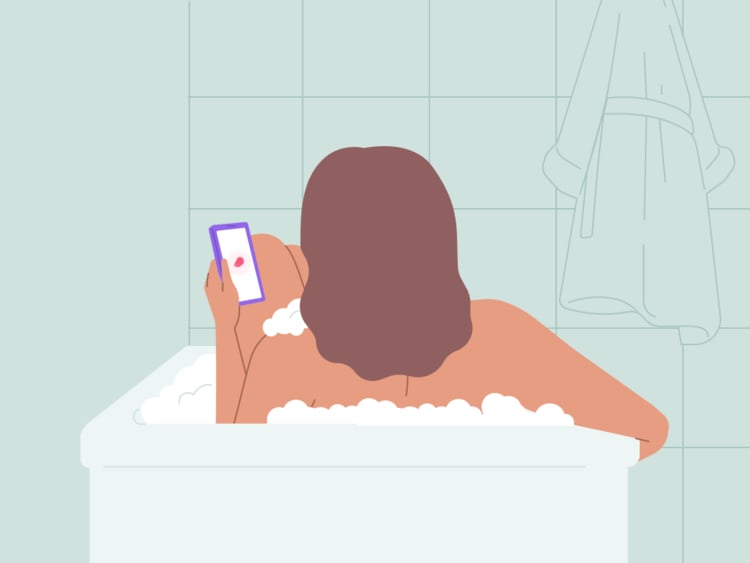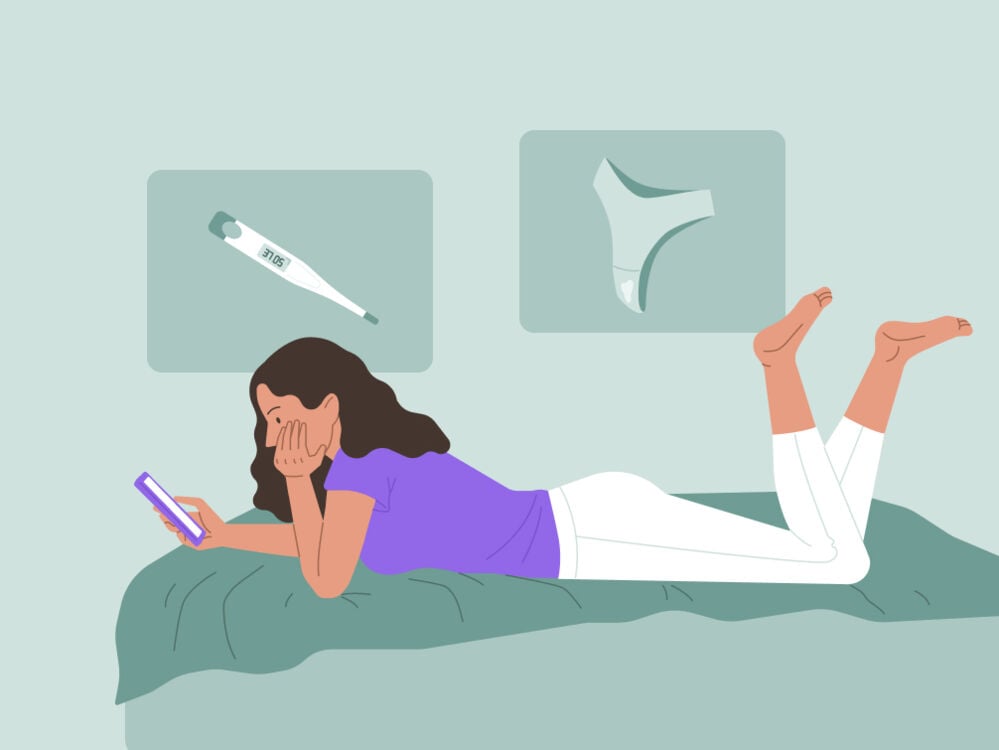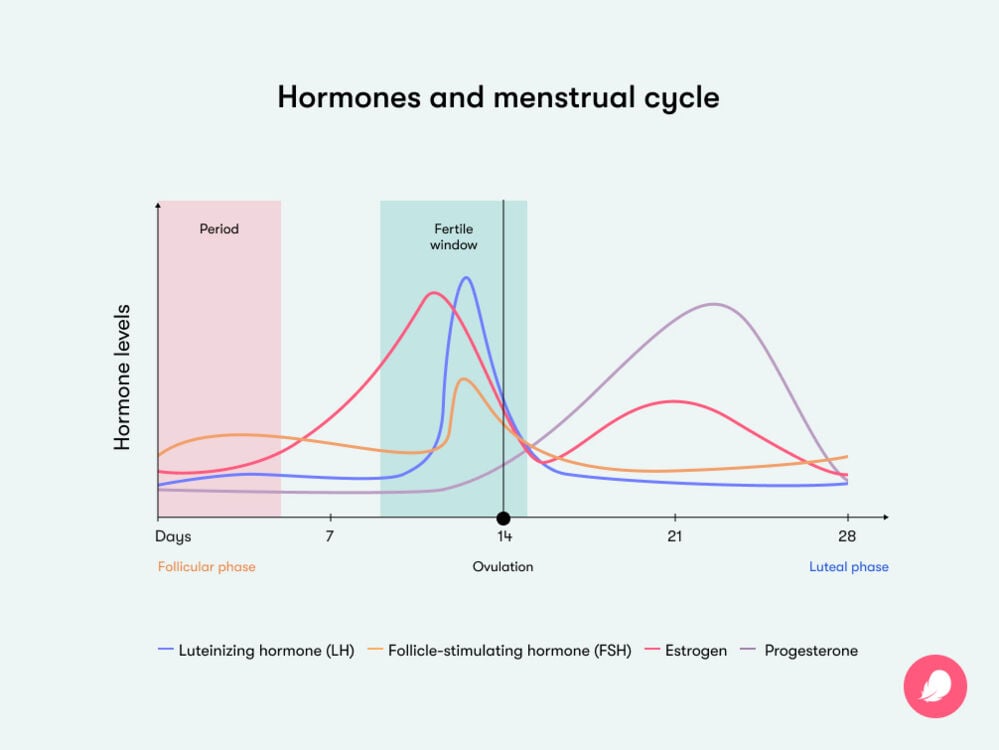Find out what happens during your follicular phase, where it falls in the menstrual cycle, and how it could impact how you feel.
-
Tracking cycle
-
Getting pregnant
-
Pregnancy
-
Help Center
-
Flo for Partners
-
Anonymous Mode
-
Flo app reviews
-
Flo Premium New
-
Secret Chats New
-
Symptom Checker New
-
Your cycle
-
Health 360°
-
Getting pregnant
-
Pregnancy
-
Being a mom
-
LGBTQ+
-
Quizzes
-
Ovulation calculator
-
hCG calculator
-
Pregnancy test calculator
-
Menstrual cycle calculator
-
Period calculator
-
Implantation calculator
-
Pregnancy weeks to months calculator
-
Pregnancy due date calculator
-
IVF and FET due date calculator
-
Due date calculator by ultrasound
-
Medical Affairs
-
Science & Research
-
Pass It On Project New
-
Privacy Portal
-
Press Center
-
Flo Accuracy
-
Careers
-
Contact Us
What is the follicular phase? Know your cycle and symptoms


Every piece of content at Flo Health adheres to the highest editorial standards for language, style, and medical accuracy. To learn what we do to deliver the best health and lifestyle insights to you, check out our content review principles.
You might often think about your cycle as being broken up by the big events that happen during it, like your period or ovulation. However, did you know that your cycle can be split up into two distinct phases, and, due to hormone changes, you might notice different signs and symptoms throughout?
The first phase of your menstrual cycle is called the follicular phase. It begins on the first day of your period and ends at ovulation (when one of your ovaries releases an egg). In this phase, you might feel more energized, and your sex drive could be higher. But why is that? Here’s the lowdown on your follicular phase with expert advice from an obstetrician and gynecologist and why you might feel different during this part of your cycle.
Key takeaways
- The follicular phase is the first part of your menstrual cycle. It can be tough to give a definitive answer on how long your follicular phase will last, as your cycle is completely personal to you. The length of the follicular phase can differ from person to person and cycle to cycle.
- During this part of your cycle, you’ll have a period, and your ovaries will develop and release a new egg during ovulation. So, a lot is going on in your body during your follicular phase. All of these processes are triggered by hormone changes.
- Your body is at its most fertile at the end of the follicular phase and during ovulation. This is often referred to as your fertile window.
What is the follicular phase?
Before we get into how you might feel during your follicular phase, it can be good to understand how your cycle is broken up. Your menstrual cycle can be split into two phases: the follicular phase and the luteal phase. In between these two phases is ovulation — when one of your ovaries develops and releases an egg to be potentially fertilized by a sperm.
During your follicular phase, the hormones called follicle-stimulating hormone (FSH) and estrogen are released, which prompt small fluid-filled sacs called follicles to develop in your ovaries. These follicles contain eggs, and one of these eggs is released at ovulation. As you near ovulation, you’re more likely to get pregnant. Your fertile window is classed as the five days before you ovulate and the day after.
Take a quiz
Find out what you can do with our Health Assistant
Dr. Sara Twogood, an obstetrician and gynecologist at Cedars-Sinai Medical Group, US, who sits on Flo’s expert board, explains: “During the follicular phase, the follicles in the ovary are being stimulated to help an egg prepare for ovulation. Estrogen is the dominant hormone. People often feel most confident and have a higher libido in this phase. This is the body’s evolutionary way to try to propagate the species [or procreate] — because having sex in this phase can result in a pregnancy.”
What are the common symptoms of the follicular phase?
Everyone is different, so aside from logging it in your cycle tracker, you may not notice any changes in the way you feel during your follicular cycle. However, some signs include:
Period symptoms
Your follicular phase starts on the first day of your period. So, you may experience the usual symptoms of menstruation or premenstrual syndrome. These include cramps, bloating, low energy, breast tenderness, and mood swings. Be kind to yourself during this time if you don’t totally feel like yourself. Get plenty of rest when you feel like you need it, and take painkillers if you think they’d be helpful.

Higher energy levels
As your period ends, you may feel more energized.
Body temperature
In the follicular phase, your body temperature should be between 97º and 97.6ºF before it increases during ovulation and the luteal phase. You can track your temperature by taking it each morning as soon as you wake up. You’ll need to use a special thermometer that monitors basal body temperature. This is your temperature when you’re at total rest.
To understand your cycle better, you can log your symptoms using an app like Flo. This may help you spot patterns and understand your body better. Cycle-tracking apps like Flo can also help you come to grips with the fertility awareness method. This is where you track your most fertile days. If you’re trying to conceive, this can give you general guidance on when to have conception sex.
And if you don’t want to be pregnant, it can help you understand when not to have unprotected sex. It’s worth noting that if you don’t want to become pregnant, then you should always use a method of birth control alongside the fertility awareness method, as it isn’t considered to be an effective form of contraception, especially if you have irregular periods.
What actually happens in the follicular phase?
Your follicular and luteal phases can be separated by the events that happen during them. So here’s what’s actually going on during the first part of your cycle.
When you’re born, you have a set number of eggs in your body, ranging between 1 and 2 million. Pretty amazing, right? This number declines over time. In the follicular phase, some of these eggs start to develop, but only one fully matures. This is the egg that is released when you reach ovulation.
In the follicular phase:
- The gland in your brain that is responsible for triggering hormone production releases a hormone called FSH. This hormone causes your ovaries to produce follicles containing unfertilized eggs.
- One of these follicles, known as the dominant follicle, develops quicker than the rest. As it does so, the egg inside the dominant follicle matures, and this egg is released at ovulation.

- The dominant follicle also releases estrogen, which thickens the inner lining of the uterus (the endometrium) so that an embryo can implant there if your egg is fertilized by a sperm. The increase in estrogen, in turn, causes your body to produce less FSH, so the other follicles are reabsorbed back into your body.
- The high levels of estrogen also prompt your body to release another hormone, called luteinizing hormone, which causes the mature egg to break out of the dominant follicle and be released at ovulation.
How long does the follicular phase last?
Since everyone’s cycle is different, it can be hard to say how long your follicular phase will last. It can range anywhere from around 14 and 21 days and can change as you get older. “The follicular phase is the part of the cycle that fluctuates the most,” says Dr. Twogood.
A longer follicular phase doesn’t mean you are less likely to get pregnant; it most likely just means that you have a longer menstrual cycle. It’s common for your cycle to shorten as you enter perimenopause.
Getting to know your menstrual cycle
As you get to know your menstrual cycle a little better, it’s good to remember that:
- The follicular phase begins on the first day of your period and ends with ovulation.
- It can be handy to know when you’re in your follicular phase if you’re cycle tracking or trying to get pregnant.
- You can use an app like Flo to log your symptoms to help you see any patterns in the way you feel.
FAQs
What is the menstrual cycle?
The menstrual cycle is the time between the first day of your period to the day before your next one. Events like your period and ovulation are triggered by your changing hormone levels throughout your cycle. While the average cycle lasts around 28 days, yours would be considered typical if it lasts between 21 and 35 days.
What’s the difference between the follicular phase and luteal phase?
The follicular and luteal phases can be split up by what happens during them. In the follicular phase, an egg is matured and is released at ovulation. In the luteal phase, this egg travels from your ovary through the uterine or fallopian tube to your uterus.
Can a woman get pregnant during the follicular phase?
Yes. Your fertile window is classed as five days before you ovulate and the day after. This is the time you’re most likely to get pregnant. You can learn more about sex and the menstrual cycle here.


Hey, I'm Anique
I started using Flo app to track my period and ovulation because we wanted to have a baby.


The Flo app helped me learn about my body and spot ovulation signs during our conception journey.


I vividly
remember the day
that we switched
Flo into
Pregnancy Mode — it was
such a special
moment.
Real stories, real results
Learn how the Flo app became an amazing cheerleader for us on our conception journey.
References
“Basal Body Temperature for Natural Family Planning.” Mayo Clinic, 10 Feb. 2023, www.mayoclinic.org/tests-procedures/basal-body-temperature/about/pac-20393026.
“Follicular Phase.” Cleveland Clinic, my.clevelandclinic.org/health/body/23953-follicular-phase. Accessed 1 July 2024.
“Follicular Phase.” ScienceDirect, www.sciencedirect.com/topics/biochemistry-genetics-and-molecular-biology/follicular-phase. Accessed 1 July 2024.
“Having a Baby after Age 35: How Aging Affects Fertility and Pregnancy.” The American College of Obstetricians and Gynecologists, Feb. 2023, www.acog.org/womens-health/faqs/having-a-baby-after-age-35-how-aging-affects-fertility-and-pregnancy.
“Having a Baby after Age 35: How Aging Affects Fertility and Pregnancy.” The American College of Obstetricians and Gynecologists, Feb. 2023, www.acog.org/womens-health/faqs/having-a-baby-after-age-35-how-aging-affects-fertility-and-pregnancy.
Holesh, Julie E., et al. “Physiology, Ovulation.” StatPearls, StatPearls Publishing, 2023, www.ncbi.nlm.nih.gov/books/NBK441996/.
“Luteal Phase.” Cleveland Clinic, my.clevelandclinic.org/health/articles/24417-luteal-phase. Accessed 1 July 2024.
“Menstrual Cycle.” Cleveland Clinic, my.clevelandclinic.org/health/articles/10132-menstrual-cycle. Accessed 1 July 2024.
“Menstrual Cycle: What’s Normal, What’s Not.” Mayo Clinic, 22 Apr. 2023, www.mayoclinic.org/healthy-lifestyle/womens-health/in-depth/menstrual-cycle/art-20047186.
“Nutrition and Exercise throughout Your Menstrual Cycle.” Cleveland Clinic, 4 Apr. 2023, health.clevelandclinic.org/nutrition-and-exercise-throughout-your-menstrual-cycle.
“Perimenopause.” Cleveland Clinic, my.clevelandclinic.org/health/diseases/21608-perimenopause. Accessed 1 July 2024.
“Premenstrual Syndrome (PMS).” Mayo Clinic, 25 Feb. 2022, www.mayoclinic.org/diseases-conditions/premenstrual-syndrome/symptoms-causes/syc-20376780.
“The Menstrual Cycle: Menstruation, Ovulation, and How Pregnancy Occurs.” The American College of Obstetricians and Gynecologists, Jan. 2022, www.acog.org/womens-health/infographics/the-menstrual-cycle.
Thiyagarajan, Dhanalakshmi K., et al. “Physiology, Menstrual Cycle.” StatPearls, StatPearls Publishing, 2022, www.ncbi.nlm.nih.gov/books/NBK500020.
Witt, Barry. “Trying to Get Pregnant? Here’s When to Have Sex.” The American College of Obstetricians and Gynecologists, Aug. 2023, www.acog.org/womens-health/experts-and-stories/the-latest/trying-to-get-pregnant-heres-when-to-have-sex.




